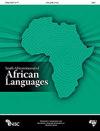Family language policy, school language practices and language socialisation among the Tonga
IF 0.4
0 LANGUAGE & LINGUISTICS
引用次数: 0
Abstract
This study investigates the interface between school language practices and children’s language socialisation among speakers of the Tonga language in Binga, Zimbabwe. It is couched in the view that extra-familial language practices and experiences have a bearing on language socialisation patterns on the home domain. The study, therefore, examines how language practices in the school are infused with language practices within the family milieu, and is informed by the twin concepts of family language policy and language socialisation. To understand the nature of the interaction, we elicited and analysed perspectives of selected first language (L1) Tonga parents and their school-going children on how they thought school language practices are related with language choices and language socialisation preferences within the family linguistic ecology. The major finding is that children’s school language experiences and practices permeate the home in various ways. Their importance in family language policies cast children as agents of their own language socialisation as opposed to being passive subjects of ‘expert’ parental language socialisation. The school is therefore an important language socialisation sphere which has a far-reaching influence on language use in the family. It should thus be considered as a domain relevant to the articulation of family language policies by speakers of minoritised languages.汤加的家庭语言政策、学校语言实践和语言社会化
本研究调查了津巴布韦宾加汤加语使用者的学校语言实践与儿童语言社交之间的关系。它表达的观点是,家庭外的语言实践和经历对家庭领域的语言社交模式有影响。因此,这项研究考察了学校的语言实践如何与家庭环境中的语言实践相结合,并从家庭语言政策和语言社会化的双重概念中得到启示。为了理解互动的本质,我们引出并分析了选定的第一语言(L1)汤加父母及其在校儿童的观点,即他们认为学校语言实践如何与家庭语言生态中的语言选择和语言社交偏好相关。主要发现是,孩子们的学校语言体验和实践以各种方式渗透到家庭中。他们在家庭语言政策中的重要性使儿童成为自己语言社交的代理人,而不是“专家”父母语言社交的被动主体。因此,学校是一个重要的语言社交领域,对家庭语言使用有着深远的影响。因此,它应被视为一个与少数民族语言使用者阐明家庭语言政策有关的领域。
本文章由计算机程序翻译,如有差异,请以英文原文为准。
求助全文
约1分钟内获得全文
求助全文
来源期刊

South African Journal of African Languages
LANGUAGE & LINGUISTICS-
CiteScore
0.50
自引率
0.00%
发文量
30
期刊介绍:
The South African Journal of African Languages is a peer-reviewed research journal devoted to the advancement of African (Bantu) and Khoi-San languages and literatures. Papers, book reviews and polemic contributions of a scientific nature in any of the core areas of linguistics, both theoretical (e.g. syntax, phonology, semantics) and applied (e.g. sociolinguistic topics, language teaching, language policy), and literature, based on original research in the context of the African languages, are welcome. The journal is the official mouthpiece of the African Language Association of Southern Africa (ALASA), established in 1979.
 求助内容:
求助内容: 应助结果提醒方式:
应助结果提醒方式:


